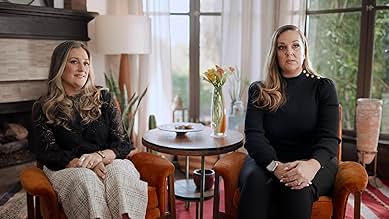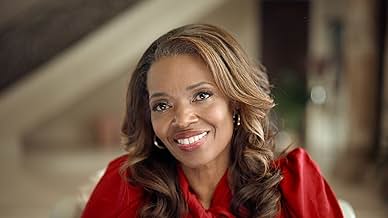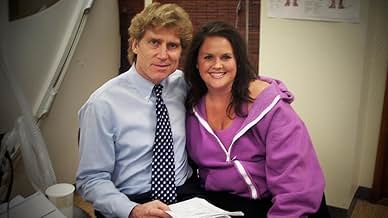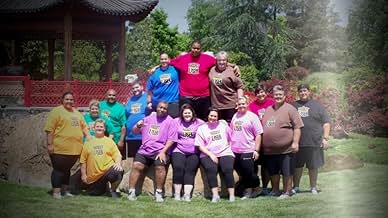Ajouter une intrigue dans votre langueTakes an inside look at the making of the hit reality TV competition, exploring the good, the bad, and the complicated.Takes an inside look at the making of the hit reality TV competition, exploring the good, the bad, and the complicated.Takes an inside look at the making of the hit reality TV competition, exploring the good, the bad, and the complicated.
Parcourir les épisodes
Avis en vedette
7j_l_
Almost all of these *adult* contestants had watched the show and knew what to expect as far as how intense the trainers were, challenges/temptations, etc... and they still signed up because they "wanted to be on the show so badly." And they also could have left willingly at any time, and they stayed. But still somehow found a way to paint themselves as victims. Joelle is *still* absolutely insufferable. Zero self awareness or accountability. Every contestant was handed a life-changing opportunity to do and accomplish hard things - and knew it would be grueling and sometimes embarrassing. But somehow instead of gratitude, so many of them can only focus on the negative. Like they were owed something. Reality TV - in general - is embarrassing. And that's sort of the point. Whether is housewives or dating shows, you're giving up something (often their dignity) to get something. Stop complaining about it. You knew. Even Tracey, when asked at the end if she'd go back on the show, she couldn't definitively answer - insinuating that possibly yes she would - even after all her complaining.
The biggest losers here, in my view, are the show's creators - profiting off televised humiliation and suffering while feigning selective memory. David Broome said, "It would be hard for me to comment on the sheriff investigation because I just don't remember it." His co-creator JD Roth strikes me as even more objectionable, with that ever-present smirk as he talks about masterminding the show the way a serial killer might reminisce about their victims.
This is a story of reckless TV executives chasing the next big thing, willing to go to any length to get it, yet unwilling to do the basic work of hiring the right professionals - dietitians, chefs, psychotherapists. They missed the chance to use this platform to teach a nation how to choose better food, cook easy healthy meals, work through unresolved emotional issues, and practice genuine self-care. As someone with a graduate degree in dietetics, I see obesity not only as a physical issue but also a deeply psychological one.
The documentary touched on manipulative and unethical challenges, the toll on contestants during and after filming, and the long-term damage, from slower metabolisms to chronic ailments. But it failed to widen the lens to the real backdrop: America's obesogenic environment, where unhealthy, ultra-processed foods are cheaper and more accessible than their healthier counterparts. These sugar- and fat-laden products are exactly what emotional eaters, or those chasing a dopamine hit, are drawn to.
I wish the documentary had gone deeper into how each former contestant ended up at their starting weight and what was going on in their inner world. I suspect the common thread would have been self-loathing and negative self-talk. Tracey Yukich put it best: "You need to cheer for yourself... The show didn't change my life. I changed my life. I did that."
This is a story of reckless TV executives chasing the next big thing, willing to go to any length to get it, yet unwilling to do the basic work of hiring the right professionals - dietitians, chefs, psychotherapists. They missed the chance to use this platform to teach a nation how to choose better food, cook easy healthy meals, work through unresolved emotional issues, and practice genuine self-care. As someone with a graduate degree in dietetics, I see obesity not only as a physical issue but also a deeply psychological one.
The documentary touched on manipulative and unethical challenges, the toll on contestants during and after filming, and the long-term damage, from slower metabolisms to chronic ailments. But it failed to widen the lens to the real backdrop: America's obesogenic environment, where unhealthy, ultra-processed foods are cheaper and more accessible than their healthier counterparts. These sugar- and fat-laden products are exactly what emotional eaters, or those chasing a dopamine hit, are drawn to.
I wish the documentary had gone deeper into how each former contestant ended up at their starting weight and what was going on in their inner world. I suspect the common thread would have been self-loathing and negative self-talk. Tracey Yukich put it best: "You need to cheer for yourself... The show didn't change my life. I changed my life. I did that."
It was a fascinating watch, but I'm not sure it really went anywhere. There was no solid finding or conclusion-just a range of opinions. So, not a great ending.
For me, however, there were some takeaways:
1. The treatment of the woman with rhabdomyolysis was appalling. If her allegations are true, she is owed at least an apology from the trainers and producers-possibly more. It's a reminder that very few people truly understand rhabdo.
2. The Biggest Loser was always about entertainment and money. It was a mistake to think otherwise.
3. The doctor seemed like a good guy. I only wish he had been more outspoken.
4. Weight loss isn't achieved by exercise-it's about calorie deficit. As Bob acknowledged, the exercise was largely for show. At the same time, too steep a calorie deficit is dangerous and unhealthy in the long term. The trainers should have known better.
5. There was definitely some fat-shaming. And some of what the trainers did crossed the line.
For me, however, there were some takeaways:
1. The treatment of the woman with rhabdomyolysis was appalling. If her allegations are true, she is owed at least an apology from the trainers and producers-possibly more. It's a reminder that very few people truly understand rhabdo.
2. The Biggest Loser was always about entertainment and money. It was a mistake to think otherwise.
3. The doctor seemed like a good guy. I only wish he had been more outspoken.
4. Weight loss isn't achieved by exercise-it's about calorie deficit. As Bob acknowledged, the exercise was largely for show. At the same time, too steep a calorie deficit is dangerous and unhealthy in the long term. The trainers should have known better.
5. There was definitely some fat-shaming. And some of what the trainers did crossed the line.
The staff and trainers are very arrogant, condescending, dismissive and disrespectful. No accountability whatsoever. A lot of blaming the contestants when we all watched the abuse and demeaning weekly. It is a reality show but what's real is people need lifelong support not boot camp. They are truly the BIGGEST losers.
I think this is less a documentary and more a self-aggrandizing recount of a long-running reality television series. Even the (tacit and semi-overt) "admissions" regarding negative health outcomes for some participants just didn't justify the length of time required to watch this offering. I fear it just didn't break any new ground about this topic.
Meilleurs choix
Connectez-vous pour évaluer et surveiller les recommandations personnalisées
Détails
- Durée
- 2h 4m(124 min)
- Couleur
Contribuer à cette page
Suggérer une modification ou ajouter du contenu manquant

































